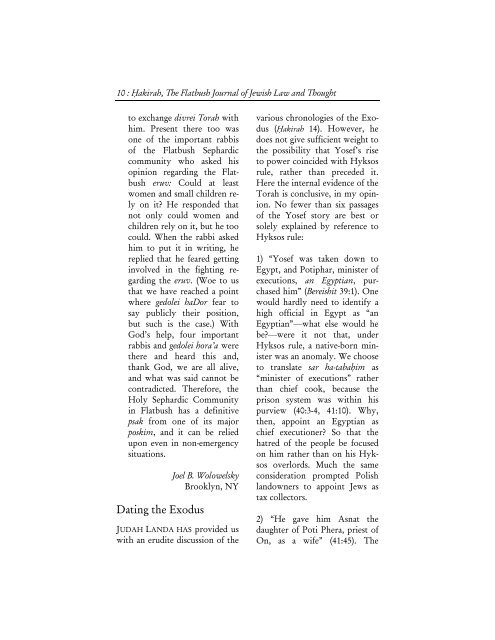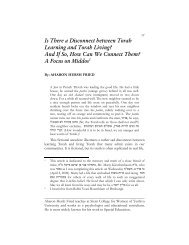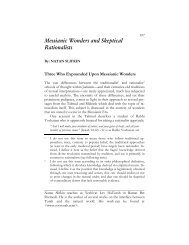the letter. - Hakirah.org
the letter. - Hakirah.org
the letter. - Hakirah.org
You also want an ePaper? Increase the reach of your titles
YUMPU automatically turns print PDFs into web optimized ePapers that Google loves.
10 : Hạkirah, The Flatbush Journal of Jewish Law and Thought<br />
to exchange divrei Torah with<br />
him. Present <strong>the</strong>re too was<br />
one of <strong>the</strong> important rabbis<br />
of <strong>the</strong> Flatbush Sephardic<br />
community who asked his<br />
opinion regarding <strong>the</strong> Flatbush<br />
eruv: Could at least<br />
women and small children rely<br />
on it He responded that<br />
not only could women and<br />
children rely on it, but he too<br />
could. When <strong>the</strong> rabbi asked<br />
him to put it in writing, he<br />
replied that he feared getting<br />
involved in <strong>the</strong> fighting regarding<br />
<strong>the</strong> eruv. (Woe to us<br />
that we have reached a point<br />
where gedolei haDor fear to<br />
say publicly <strong>the</strong>ir position,<br />
but such is <strong>the</strong> case.) With<br />
God’s help, four important<br />
rabbis and gedolei hora’a were<br />
<strong>the</strong>re and heard this and,<br />
thank God, we are all alive,<br />
and what was said cannot be<br />
contradicted. Therefore, <strong>the</strong><br />
Holy Sephardic Community<br />
in Flatbush has a definitive<br />
psak from one of its major<br />
poskim, and it can be relied<br />
upon even in non-emergency<br />
situations.<br />
Dating <strong>the</strong> Exodus<br />
Joel B. Wolowelsky<br />
Brooklyn, NY<br />
JUDAH LANDA HAS provided us<br />
with an erudite discussion of <strong>the</strong><br />
various chronologies of <strong>the</strong> Exodus<br />
(<strong>Hakirah</strong> 14). However, he<br />
does not give sufficient weight to<br />
<strong>the</strong> possibility that Yosef’s rise<br />
to power coincided with Hyksos<br />
rule, ra<strong>the</strong>r than preceded it.<br />
Here <strong>the</strong> internal evidence of <strong>the</strong><br />
Torah is conclusive, in my opinion.<br />
No fewer than six passages<br />
of <strong>the</strong> Yosef story are best or<br />
solely explained by reference to<br />
Hyksos rule:<br />
1) “Yosef was taken down to<br />
Egypt, and Potiphar, minister of<br />
executions, an Egyptian, purchased<br />
him” (Bereishit 39:1). One<br />
would hardly need to identify a<br />
high official in Egypt as “an<br />
Egyptian”—what else would he<br />
be—were it not that, under<br />
Hyksos rule, a native-born minister<br />
was an anomaly. We choose<br />
to translate sar ha-tabahim as<br />
“minister of executions” ra<strong>the</strong>r<br />
than chief cook, because <strong>the</strong><br />
prison system was within his<br />
purview (40:3-4, 41:10). Why,<br />
<strong>the</strong>n, appoint an Egyptian as<br />
chief executioner So that <strong>the</strong><br />
hatred of <strong>the</strong> people be focused<br />
on him ra<strong>the</strong>r than on his Hyksos<br />
overlords. Much <strong>the</strong> same<br />
consideration prompted Polish<br />
landowners to appoint Jews as<br />
tax collectors.<br />
2) “He gave him Asnat <strong>the</strong><br />
daughter of Poti Phera, priest of<br />
On, as a wife” (41:45). The
















